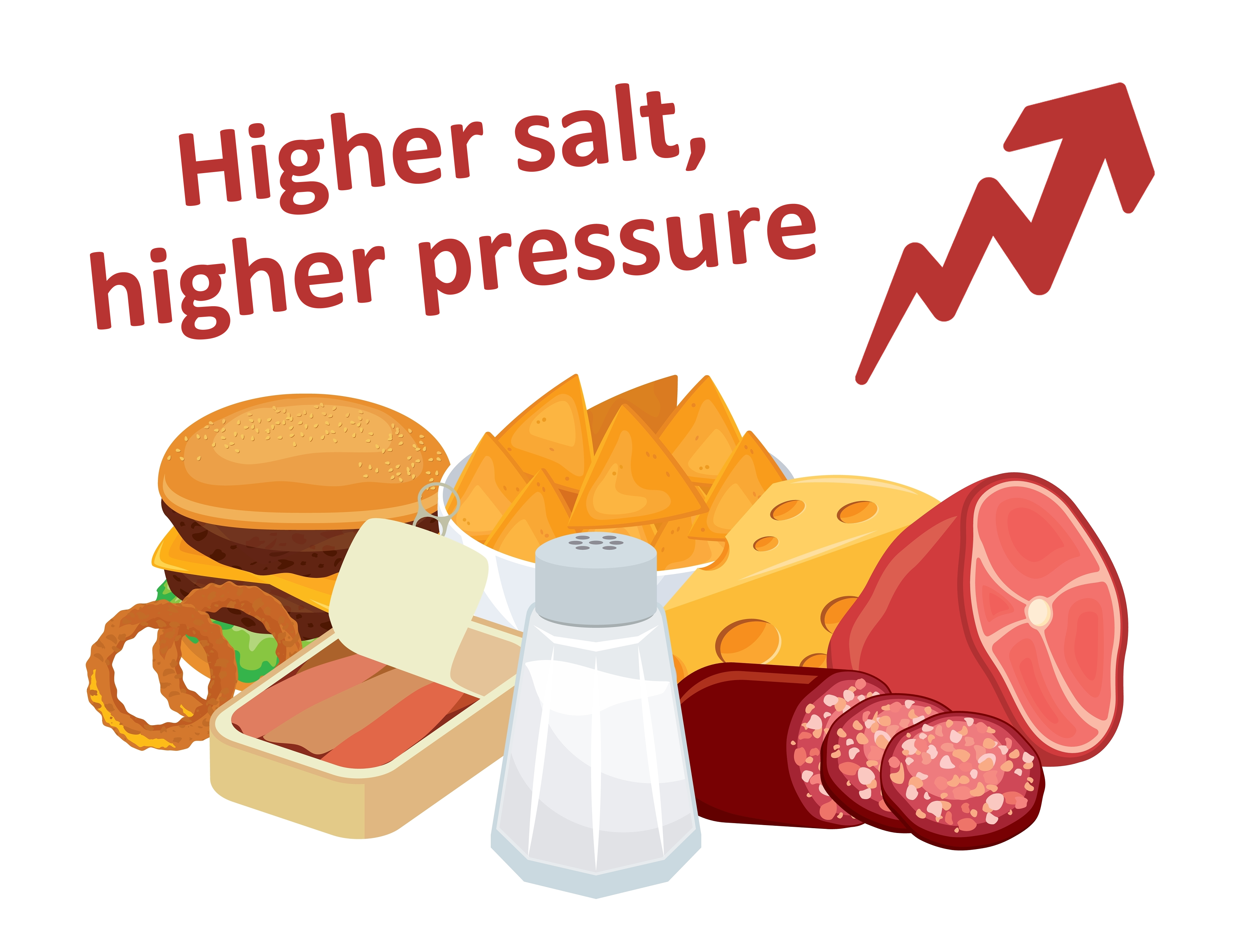Salt contains two chemicals: sodium and chloride.1 Sodium is a critical nutrient in the body.1,2 It helps muscles and nerves function properly and helps regulate the body’s fluid balance. The kidneys remove excess sodium from the body. Excess sodium can result in more fluid being retained in the body as the kidneys struggle to maintain the balance and excrete the excess sodium.
Randomized controlled trials that have looked at the relationship of excess sodium and high blood pressure have focused on how a reduction of dietary sodium can reduce blood pressure.3-5 Studies that look at the causal effect of excess sodium on the development of hypertension or its relationship to cardiovascular disease (CVD) have mainly been prospective cohort studies.6 A 2016 examination of the literature concluded that regardless of questions remaining regarding the causal relationships between sodium and CVD, reducing excess sodium intake should continue to be a public health strategy to reduce CVD events and mortality.
A 2013 Cochrane review of 22 trials with 990 hypertensive participants (median age 50 years) found that the baseline average salt intake was 9.5 g/day (range 7.3 – 11.2 g/day).3 A reduction of dietary sodium by 4.4 g/day for four or more weeks reduced systolic blood pressure by 5.39 mm Hg (95% confidence interval [CI] [6.62 – 4.15], I2=61%) and diastolic blood pressure by 2.82 mm Hg (95% CI [3.54 – 2.11], I2=52%).
A 2011 analysis7 of data from the Third National Health and Nutrition Examination Survey Linked Mortality Data (a prospective cohort study, n=12,267 adults) examined the relationship between sodium and potassium intake and their relation to all-cause and cardiovascular disease (CVD) and ischemic heart disease (IHD) related mortality. They found that higher sodium intake was related to a raised all-cause mortality (hazard ratio 1.20 per 1000 mg/d, 95% CI [1.03 – 1.41]). The relationship with CVD- and IHD-related mortality and higher sodium intake was not statistically significant. However, they also found that a higher sodium to potassium ratio was related to an increased incidence of CVD and IHD mortality.
A global review8 of sodium intake and cardiovascular death estimated that 1.65 million deaths in 2010 could be attributed to sodium intake above the World Health Organization’s reference intake of 2.0 g/day. The mean daily consumption of sodium worldwide was 3.95 g/day. Further analysis found that 11.9% (95% CI [7.8 – 16.4]) of all cardiovascular-related deaths in 2010 in the US and Canada could be attributed to sodium intake of >1 g/day.
According to the most recent US national survey and analysis, the estimated average daily sodium intake among US adults (n=5,047, age 20 or older) during 2013 – 2014 was 3529 mg.9 This survey found that foods with the most sodium were store-bought processed food and food from restaurants. The 2015 – 2020 Dietary Guidelines for Americans, 8th edition report recommends that people age 14 and older consume less than 2300 mg of sodium daily.10 This report also found that 89% of the US population age one year or older exceeds their daily sodium intake limit.
The 2017 American College of Cardiology and American Heart Association hypertension guidelines recommend reducing sodium in the diet to lower blood pressure [Strong Recommendation (Level A)].11 Adults should ultimately aim for less than 1500 mg/day of sodium in their diet but at a minimum should reduce their intake by at least 1000 mg/day. Reducing dietary sodium may result in a 5 mm Hg reduction in systolic blood pressure.3,4,11,12
References
- Ha SK. Dietary salt intake and hypertension. Electrolyte Blood Press 2014; 12 (1): 7-18.
- Elijovich F, Weinberger MH, Anderson CA, et al. Salt sensitivity of blood pressure: a scientific statement from the American Heart Association. Hypertension 2016; 68 (3): e7-e46.
- He FJ, Li J, Macgregor GA. Effect of longer term modest salt reduction on blood pressure: Cochrane systematic review and meta-analysis of randomised trials. BMJ 2013; 346: f1325.
- Sacks FM, Svetkey LP, Vollmer WM, et al. Effects on blood pressure of reduced dietary sodium and the Dietary Approaches to Stop Hypertension (DASH) diet. DASH-Sodium Collaborative Research Group. N Engl J Med 2001; 344 (1): 3-10.
- Graudal NA, Hubeck-Graudal T, Jurgens G. Effects of low sodium diet versus high sodium diet on blood pressure, renin, aldosterone, catecholamines, cholesterol, and triglyceride. Cochrane Database Syst Rev 2017; 4: Cd004022.
- Cogswell ME, Mugavero K, Bowman BA, Frieden TR. Dietary sodium and cardiovascular disease risk--measurement matters. N Engl J Med 2016; 375 (6): 580-586.
- Yang Q, Liu T, Kuklina EV, et al. Sodium and potassium intake and mortality among US adults: prospective data from the Third National Health and Nutrition Examination Survey. Arch Intern Med 2011; 171 (13): 1183-1191.
- Mozaffarian D, Fahimi S, Singh GM, et al. Global sodium consumption and death from cardiovascular causes. N Engl J Med 2014; 371 (7): 624-634.
- Quader ZS, Zhao L, Gillespie C, et al. Sodium intake among persons aged >/=2 years - United States, 2013-2014. MMWR Morb Mortal Wkly Rep 2017; 66 (12): 324-238.
- 2015 – 2020 dietary guidelines for Americans. 8 ed: U.S. Department of Health and Human Services and U.S. Department of Agriculture; 2015.
- Whelton PK, Carey RM, Aronow WS, et al. 2017 ACC/AHA/AAPA/ABC/ACPM/AGS/APhA/ASH/ASPC/NMA/PCNA guideline for the prevention, detection, evaluation, and management of high blood pressure in adults: executive summary: a report of the American College of Cardiology/American Heart Association Task Force on Clinical Practice Guidelines. Hypertension 2017.
- Aburto NJ, Ziolkovska A, Hooper L, Elliott P, Cappuccio FP, Meerpohl JJ. Effect of lower sodium intake on health: systematic review and meta-analyses. BMJ 2013; 346: f1326.


.png)